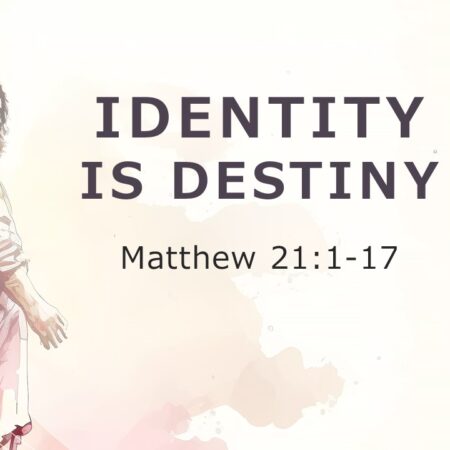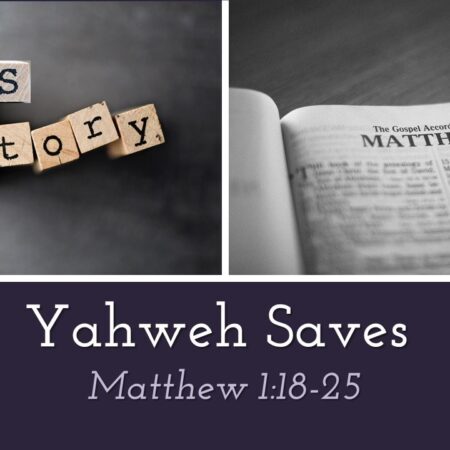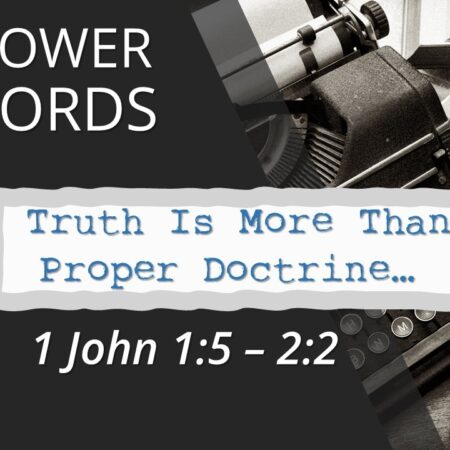John 20:1-30 Hebrews 1:1-14 1 Corinthians 15:12-19 Genesis 3:14-15 Romans 3:21-26 John 3:1-8 John 20:1-9
Sermons on Fundamentals of the Faith
John 13:33 Matthew 12:40-42 Luke 18:31-33 Genesis 2:24-25 Genesis 3:8-13 Romans 6:16 Luke 4:1-13 Luke 11:20 John 14:1-31
Matthew 21:1-17 Matthew 16:13-20 Matthew 16:21-23 Matthew 17:1-9 Luke 9:30-31 Deuteronomy 34:1-12 Deuteronomy 18:18 John 1:14-17 Exodus 3:1-2 Matthew 26:39 Matthew 26:37 “For Christ to be glorious was almost a…
Carmen Joy Imes in her book “Bearing God’s Name” writes:
“Matthew’s gospel breaks neatly into five blocks of teaching, mimicking the five books of the Torah (Genesis, Exodus, Leviticus, Numbers, Deuteronomy).
These five blocks of teaching are preceded by an introductory story in which Jesus’ life is in danger because King Herod, like Pharaoh, is killing Jewish babies. To escape, his parents take him to Egypt. It’s an inside-out Exodus story. When the coast is clear, they return to Palestine, retracting Israel’s journey from Egypt to the promised land. Next, we fast forward to Jesus’ adulthood, where he passes through the waters of baptism in the Jordan, reminding us of Israel’s crossing both the Red Sea and the Jordan.
After this, Jesus is sent by the Spirit into the wilderness for forty days, where he reenacts Israel’s wilderness wanderings.”
Baptism does not produce salvation in this text, Rather, it corresponds to something that does, THE DEATH OF JESUS (v 19) and the RESURRECTION (v 21)
“Baptism saves” if one makes a decision; a pledge of loyalty oath,
a public proclamation of who is on the Lord’s side in the cosmic war between good and evil.
Every Baptism is therefore a reiteration of the past and future doom of the Watchers in the wake of the gospel and the kingdom of God.
Early Christians understood the typology of this passage and its link back to 1 Enoch and Genesis 6:1-4.
This is why early baptismal formulas included a renunciation of Satan and his angels. Baptism was anything but routine. It was a symbol of spiritual warfare.” Dr. Michael Heiser “Reversing Hermon”
Who is Azazel?
We find the Biblical text in Leviticus 16:7-10
“And Aaron shall take the two goats, and he shall present them before Yahweh at the tent of assembly’s entrance. Then Aaron shall cast lots for the two goats: one lot for Yahweh and one for Azazel. And Aaron shall present the goat on which the lot for Yahweh fell, and he shall sacrifice it as a sin offering. But the must present alive before Yahweh the goat on which the lot for Azazel fell to make atonement for himself, to send it away into the desert to Azazel.”
R.T. France
“His Father is testing him in the school of privation, and his triumphant rebuttal of the devil’s suggestions will ensure that the filial bond can survive in spite of the conflict that lies ahead.”
Dr. Michael Heiser in the “Unseen Realm” makes this comment about that temptation:
“Had Jesus given in, it would have been an acknowledgment that Satan’s permission was needed to possess the nations. It wasn’t. Satan presumed power and ownership of something that, ultimately, was not his but God’s. The messaging behind Jesus’ answer is clear: Yahweh will take the nations back by his own means in his own time. He doesn’t need them to be given away in a bargain. Jesus was loyal to his Father.”
“It is curious. In the Gospels, the Devil is doing all sorts of things. He’s making pigs run off cliffs, he’s possessing people and what not. And that doesn’t happen very much anymore.
It’s because he is smart.”
The reported asked: “So what’s he doing now?”
Scalia replied: “What he’s doing now is getting people not to believe in him or in God. He’s much more successful that way.” Antonin Scalia
In May 2016 the GUARDIAN, a highly respected British daily news, published this report:
“We live with an epidemic of anxiety. In 1980, 4 percent of Americans suffered a mental disorder associated with anxiety. Today half do. The trends in Britain are similar. A third of Britons will experience anxiety disorder at some stage in their life, with an explosion of reported anxiety among teenagers and young adults. Anxiety, depression, self-harm, attention deficit disorder and profound eating problems afflict our young as never before.
Anxiety has always been part of the human condition – as has depression and tendencies to self-harm – but never, it seems, on this scale. A number of trends appear to be colliding. This is an era when everyone is expected to find their personal route to happiness at the same time as the bonds of society, faith and community – tried and tested mechanisms to support wellbeing – are fraying. Teenagers in particular – fearful of missing out – are beset by a myriad of agonizing choices about how to achieve the good life with fewer social and psychological anchors to help them navigate their way. Who can blame them if they respond with an ever rising sense of anxiety, if not panic?”
Carmen Joy Imes “Bearing God’s Name”
“The Israelites lived in a time when people were desperate to know what the gods were saying. Since the god’s didn’t normally SPEAK audibly as you and I do, priests were trained to read the signs they left in the natural world. Sometimes they manufactured situations in which the gods could reveal things to them, such as the elaborate rituals in which they dropped oil or flour into water and interpreted the results. They sacrificed animals and studied their livers or intestines for clues what the gods were thinking or what they would do next.
They watched for strange births of newborn animals with defects. THEY STUDIED THE STARS. They contacted the dead, doing whatever it took to forecast the future or discern the will of the gods. An answer was not guaranteed. Sometimes they simply could not figure out what the gods wanted.”
Barclay’s in his commentary on Matthew writes:
The Magi were originally a Median tribe. The Medes were part of the Empire of the Persians; they tried to overthrow the Persians and to substitute the power of the Medes. The attempt failed. From that time the Magi ceased to have any ambitions for power or prestige and became a tribe of priests. They became in Persia almost exactly what the Levites were in Israel. They became the teachers and instructors of the Persian Kings. In Persia no sacrifice could be offered unless one of the Magi was present. They became men of holiness and wisdom.
These Magi were men who were skilled in philosophy, medicine and natural science. They were soothsayers and interpreters of dreams.
In those ancient days all men believed in astrology. They believed that they could foretell the future from the stars, and they believed that a man’s destiny was settled by the star under which he was born.
It was not difficult to see how that belief arose. The stars pursue their unvarying courses; they represent the order of the universe.
If then there suddenly appeared some brilliant star, if the unvarying order of the heavens was broken by some special phenomenon, it did look as if God was breaking into His own order and announcing some special thing.”
It may seem to us extraordinary that these men should set out from the East to find a king, but the strange thing is that, just about the time when Jesus was born, there was in the world a strange feeling of expectation, a waiting for the coming of a king. Even the Roman historians knew about this.”
Suetonius in the “LIFE OF VESPASIAN” writes:
“There had spread over all the Orient an old and established belief, that it was fated at that time for men coming from Judea to rule the world”
Tacitus in “Histories” writes:
“there was a firm persuasion that at this very time the East was to grow powerful, and rulers coming from Judea were to acquire universal empire.”
Josephus in “Wars of the Jews” writes:
“The Jews had the belief that about that time one from their country should become governor of the habitable earth.”
Pastor Tom Doyle in his book “Dream’s and Visions”
According to BibleArcheology.org:
“Since the early days of Christianity, Biblical scholars and theologians have offered varying interpretations of the meaning and significance of the gold, frankincense and myrrh that the magi presented to Jesus, according to the Gospel of Matthew (2:11). These valuable items were standard gifts to honor a king or deity in the ancient world: gold as a precious metal, frankincense as perfume or incense, and myrrh as anointing oil.
In fact, these same three items were apparently among the gifts, recorded in ancient inscriptions, that King Seleucus II Callinicus offered to the god Apollo at the temple in Miletus in 243 B.C.E.
The Book of Isaiah, when describing Jerusalem’s glorious restoration, tells of nations and kings who will come and ‘bring gold and frankincense and shall proclaim the praise of the Lord.’” (Isaiah 60:6)
Biblical scholars have long ago arranged Matthews Gospel into five main sections, which they point out correspond with the five books of Moses, also known as the TORAH. The Jewish people call the entire Old Testament THE TANACH. All five main sections refer to Jesus’ teachings:
Section One: SERMON ON THE MOUNT 5-7)
Section Two: JESUS PERFORMS MIRACLES AND SENDS HIS DISCIPLES (8-10)
Section Three: PARABLES ABOUT THE KINGDOM (13)
Section Four: HOW GREATNESS WORKS IN THE KINGDOM (18)
Section Five: JUDGMENT IN THE KINGDOM TO COME (24-25)
Matthew simply states WHO JESUS IS and NOW YOU HAVE TO WRESTLE THROUGH THE IMPLICATIONS YOURSELF. Matthew is fully convinced that presenting Jesus this way to us, we will get to know Jesus and also get to know who we are.
In the Hebrew text the words used to describe the earth are TOHU and BOHU.
IN THE PHYSICAL REALM MEANS: without form and void or chaotic.
IN THE SPIRITUAL REALM MEANS: that which is nonfunctional and unproductive
John Walton in his book: “The Lost World of Genesis One” writes:
“In the Old Testament God has no needs and focuses functionality around people. Consequently, functionality cannot exist without people in the picture.
In Genesis people are not put in place until day six, but functionality is established with their needs and situation in mind.
This conclusion is further supported by the meaning of the repeated formula “it was good,” which I propose refers to “functioning properly”.
Such a conclusion is not arbitrary but based on the context.
Throughout Genesis 1 any number of possible meanings have been proposed for “good”. In the history of interpretation, it has often been understood in MORAL/ETHICAL terms or as a reference to the QUALITY OF WORKMANSHIP.
While the Hebrew term could be used in any of those ways, the context indicates a different direction. We can find out what the author means when saying all of these things are “good” by inquiring what it would mean for something NOT TO BE GOOD.
Fortunately, the near context offers us just such an opportunity: “It is not good for the man to be alone” (Genesis 2:18)
This has nothing to do with moral perfection or quality of workmanship – IT IS A COMMENT CONCERNING FUNCTION.
The human condition is not functionally complete without the women. Thus, throughout Genesis 1 the refrain “it was good”, expressed the functional readiness of the cosmos for human beings. Readers were assured that all functions were operating well and in accord with God’s purposes and directions.”
We all know that JESUS IS THE TRUTH and the Way and the life that we need. This is no mere metaphor, it is the very meaning of truth. The truth is alive and incarnational. TRUTH IS PERSONAL, RELATIONAL, AND COMMUNAL.
Parker “To know as we are known”
Knowing truth demands ACTION ON OUR PART.
Encountering truth involves our surrendering to honest self-examination, rooting out the old beliefs, receiving light to see things the way God sees them, and doing the work of engaging with the Holy Spirit so that He can anchor truth in our soul. That is the meaning of truth in the way that Jesus uses the term.
ATONEMENT
1 John 1:5-2:2
1:7 “the blood of Jesus cleanses us from all sin”
1:9 “he will forgive us and cleanse us from all sin”
2:2 “Jesus Christ is the atoning sacrifice (propitiation) for our sins”
• The blood is a metaphor of Jesus death on the cross. The death of Jesus cleanses us from sin
• The death of Jesus provides the means of forgiveness
• The death of Jesus by which we are forgiven is the atonic sacrifice for our sins.
“Atonement” = At-one-ment, to make right to reconcile Oxford English Dictionary
John wrote his sermon in Greek.
Greek: Hilasmos
Hebrew: kipper
Meaning: to “cover” someone’s failure; to erase the debt; to purify the relationship
This truth is more than doctrine, this truth is personal, relational and communal. It affects every aspect of our life.
Colossians 1:9-10
And so, from the day we heard, we have not ceased to pray for you, asking
• That you may be filled with the knowledge of his will in all spiritual wisdom and understanding,
• So as to walk in the manner worthy of the Lord, fully pleasing him,
• Bearing fruit in every good work and increasing in the knowledge of God.
1 Corinthians 2:7-8 Matthew 22:36-40 Matthew 28:18-20 Ephesians 3:7-10 John 14:26 Acts 1:4-5, 8 Acts 2:1-4 Deuteronomy 32:8 Colossians 2:13-15 Ephesians 1:15-21 Psalm 82:2-5
Matthew 11:28-30









